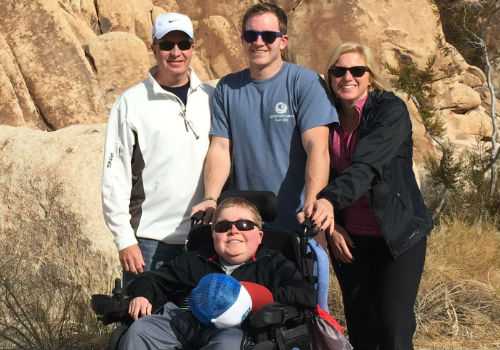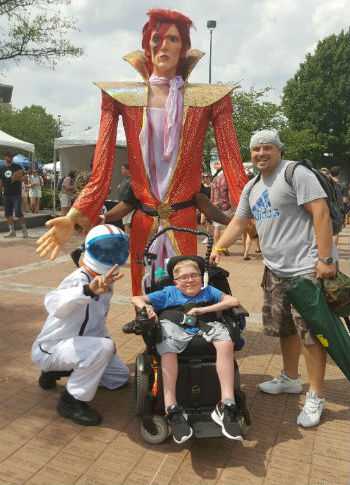Conor's Story

Conor actively advocates for people with disabilities. He pointed out to the staff at his college that the newly built walkway from disability services to another campus building had stairs at one end, and then he worked with disability services to get a ramp built. Conor also scored the winning goal in the national championship game of the United States Power Soccer Association. Conor has Duchenne muscular dystrophy. Having Duchenne means his muscles, including his heart and muscles that control breathing, will get weaker and weaker. Learning about Conor’s life is an important part of understanding what can be done by and for people with Duchenne.
Conor focuses on his living situation and plans after college. He says he might like to “live somewhere closer to the city, but not anywhere too expensive, and maybe have a few roommates with Duchenne or other disabilities. I’d like to have more information on places to live on my own.” Conor’s mom adds, “When Conor was diagnosed at age 4, the Internet was new, and things written about Duchenne were very discouraging. Now medicine is advancing and there are clinical trials for new treatments. That’s why we need information on college and independent living.”
Living independently is one part of transitioning to adulthood. Managing medical care is another. Individuals with Duchenne see many different specialists. Conor’s mom calls herself the care coordinator. She shares, “There’s a nurse coordinator at the Muscular Dystrophy Association clinic in the children’s hospital, but once you age out of the children’s hospital, it’s a problem. If Conor gets to the emergency room for some reason, the first doctor I would call is the pulmonologist (a lung disease specialist). I feel like that’s number one.” For people living with Duchenne, care coordination often becomes the responsibility of the primary caregiver. Conor’s mom says she’s the one who usually tells the other doctors about Conor’s medicines, treatments, and other care management details.

Conor’s mom says it can also be tough finding care for Conor. A few years ago, Conor needed cataract surgery. Ophthalmologists (eye specialists) typically do cataract surgery at outpatient surgery centers, but Conor needed to be at a hospital. “It took us a year and a half until I found a doctor who would do it.” She stresses the importance of care coordination, which gets more difficult as men like Conor begin managing their own care and transition to doctors who care for adults.
“I decided that eventually I have to manage my medical care, so I should try to understand it better, emailing and setting up appointments,” says Conor. He says people should “teach kids how to manage their medical expenses and their living situations after college, and maybe also talk about how you don’t always have to be stuck at home. You can be outgoing and do a lot of stuff. And you can make a difference if you really try.”
Conor and Kasey, his personal assistant and best friend, are busy making plans. They go to the movies on Fridays and enjoy playing video games. Last summer they attended a three-day outdoor music festival with 40,000 fellow fans. Both men will tell you they enjoy getting to know bands before they make it big.
What is Duchenne muscular dystrophy?
Muscular dystrophies are a group of inherited diseases that cause muscle weakness over time. Duchenne muscular dystrophy mainly affects males, and this muscle weakness appears in early childhood. Nine out of ten males, ages 15 through 24 years, with Duchenne or Becker muscular dystrophy use wheelchairs.1 Becker muscular dystrophy is similar to Duchenne, although less severe. Males with Duchenne typically live into their 20s.1As individuals with Duchenne get older, their heart muscles get weaker and may not properly pump blood to the body. In addition, the heart might beat either too fast or too slow. Similarly, the muscles that support breathing become weaker. As the disease progresses, machines may be needed to assist breathing and to stimulate coughing in order to prevent colds and lung infections.
Medicines can help individuals with Duchenne maintain some muscle strength. Treatment options may improve quality of life.
More Information
- CDC’s muscular dystrophy website
- For parents: Physical Developmental Delays: What to look for
- For healthcare professionals: childmuscleweakness.org
- Parent Project Muscular Dystrophy
- Muscular Dystrophy Association
References
- Centers for Disease Control and Prevention (CDC). Prevalence of Duchenne/Becker muscular dystrophy among males aged 5-24 years – four states, 2007. MMWR Morb Mortal Wkly Rep. 2009 Oct 16;58(40):1119-22.
- Page last reviewed: August 31, 2017
- Page last updated: August 31, 2017
- Content source:



 ShareCompartir
ShareCompartir